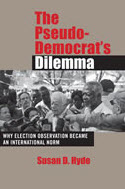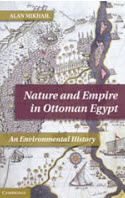Gundula Kreuzer, Susan Hyde, and Alan Mikhail Awarded International Book Prize by The MacMillan Center
November 14. New Haven, CT—Gundula Kreuzer, Associate Professor of Music, was awarded the Gaddis Smith International Book Prize for best first book for Verdi and The Germans (Cambridge University Press, 2010). Susan Hyde, Assistant Professor of Political Science, and Alan Mikhail, Assistant Professor of History, were both awarded the Gustav Ranis International Book Prize for best book. Hyde for The Pseudo-Democrat’s Dilemma (Cornell University Press, 2011), and Mikhail for Nature and Empire in Ottoman Egypt (Cambridge University Press, 2011).
Established in 2004 to recognize the distinguished legacy of two former Directors of the MacMillan Center, the prizes are awarded for books on international topics written by current members of the Yale faculty. Award recipients receive a research appointment at the MacMillan Center, and a $10,000 research award over two years.
 In Verdi and The Germans, the seminal study of Giuseppe Verdi’s German-language reception provides important new perspectives on German musical culture and nationalism from the mid nineteenth century onwards. Kreuzer argues that the concept of Germany’s musical supremacy, so dear to its nationalist cause, was continually challenged by the popularity of Italian opera, a genre increasingly epitomised by Verdi. The book traces the many facets of this Italian-German opposition in the context of intense historical developments from German unification in 1871 to the end of World War II and beyond. Drawing on an exceptionally broad range of sources, Kreuzer explores the construction of visual and biographical images of Verdi; the marketing, interpretation, and adaptation of individual works; regional, social and religious undercurrents in German musical life; and overt political appropriations.
In Verdi and The Germans, the seminal study of Giuseppe Verdi’s German-language reception provides important new perspectives on German musical culture and nationalism from the mid nineteenth century onwards. Kreuzer argues that the concept of Germany’s musical supremacy, so dear to its nationalist cause, was continually challenged by the popularity of Italian opera, a genre increasingly epitomised by Verdi. The book traces the many facets of this Italian-German opposition in the context of intense historical developments from German unification in 1871 to the end of World War II and beyond. Drawing on an exceptionally broad range of sources, Kreuzer explores the construction of visual and biographical images of Verdi; the marketing, interpretation, and adaptation of individual works; regional, social and religious undercurrents in German musical life; and overt political appropriations.
 In The Pseudo-Democrat’s Dilemma, Susan Hyde explains international election monitoring with a new theory of international norm formation. Hyde argues that election observation was initiated by states seeking international support. International benefits tied to democracy give some governments an incentive to signal their commitment to democratization without having to give up power. Invitations to nonpartisan foreigners to monitor elections, and avoiding their criticism, became a widely recognized and imitated signal of a government’s purported commitment to democratic elections. Hyde draws on cross-national data on the global spread of election observation between 1960 and 2006, detailed descriptions of the characteristics of countries that do and do not invite observers, and evidence of three ways that election monitoring is costly to pseudo-democrats: micro-level experimental tests from elections in Armenia and Indonesia showing that observers can deter election-day fraud and otherwise improve the quality of elections; illustrative cases demonstrating that international benefits are contingent on democracy in countries like Haiti, Peru, Togo, and Zimbabwe; and qualitative evidence documenting the escalating game of strategic manipulation among pseudo-democrats, international monitors, and pro-democracy forces.
In The Pseudo-Democrat’s Dilemma, Susan Hyde explains international election monitoring with a new theory of international norm formation. Hyde argues that election observation was initiated by states seeking international support. International benefits tied to democracy give some governments an incentive to signal their commitment to democratization without having to give up power. Invitations to nonpartisan foreigners to monitor elections, and avoiding their criticism, became a widely recognized and imitated signal of a government’s purported commitment to democratic elections. Hyde draws on cross-national data on the global spread of election observation between 1960 and 2006, detailed descriptions of the characteristics of countries that do and do not invite observers, and evidence of three ways that election monitoring is costly to pseudo-democrats: micro-level experimental tests from elections in Armenia and Indonesia showing that observers can deter election-day fraud and otherwise improve the quality of elections; illustrative cases demonstrating that international benefits are contingent on democracy in countries like Haiti, Peru, Togo, and Zimbabwe; and qualitative evidence documenting the escalating game of strategic manipulation among pseudo-democrats, international monitors, and pro-democracy forces.
 In Nature and Empire in Ottoman Egypt, one of the first-ever environmental histories of the Ottoman Empire, Alan Mikhail examines relations between the empire and its most lucrative province of Egypt. Based on both the local records of various towns and villages in rural Egypt and the imperial orders of the Ottoman state, this book charts how changes in the control of natural resources fundamentally altered the nature of Ottoman imperial sovereignty in Egypt and throughout the empire. In revealing how Egyptian peasants were able to use their knowledge and experience of local environments to force the hand of the imperial state, Nature and Empire in Ottoman Egypt tells a story of the connections of empire stretching from canals in the Egyptian countryside to the palace in Istanbul, from the Anatolian forest to the shores of the Red Sea, and from a plague flea’s bite to the fortunes of one of the most powerful states of the early modern world.
In Nature and Empire in Ottoman Egypt, one of the first-ever environmental histories of the Ottoman Empire, Alan Mikhail examines relations between the empire and its most lucrative province of Egypt. Based on both the local records of various towns and villages in rural Egypt and the imperial orders of the Ottoman state, this book charts how changes in the control of natural resources fundamentally altered the nature of Ottoman imperial sovereignty in Egypt and throughout the empire. In revealing how Egyptian peasants were able to use their knowledge and experience of local environments to force the hand of the imperial state, Nature and Empire in Ottoman Egypt tells a story of the connections of empire stretching from canals in the Egyptian countryside to the palace in Istanbul, from the Anatolian forest to the shores of the Red Sea, and from a plague flea’s bite to the fortunes of one of the most powerful states of the early modern world.
Contact Information:
Marilyn Wilkes
The Whitney and Betty MacMillan Center for International and Area Studies at Yale
(203) 432-3413